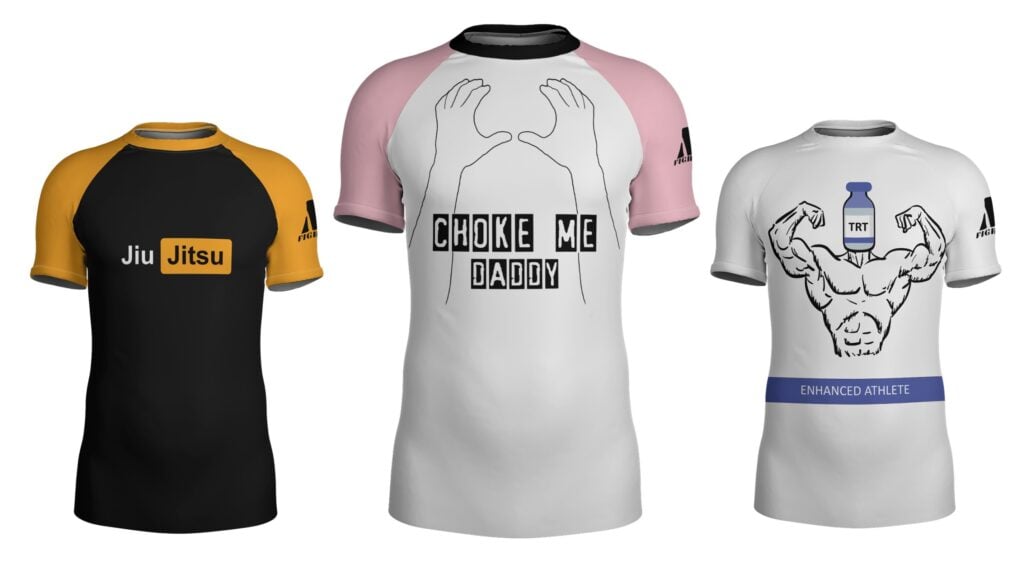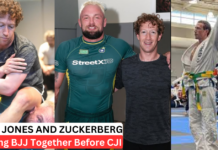
Brazilian Jiu-jitsu is an art that exposes the body to the maximum amount of microorganisms possible. Most sports either have limited contact between the surface of the body and the ground or spend a short time in a prone position. Constantly rolling around and grinding every imaginable (well, almost) body part on the ground is a Jiu-Jitsu trait by all means. Furthermore, the mats are a surface that can be a fertile ground for the growth of microorganisms. So are certain types of Gis. All in all, there are plenty of opportunities for grapplers to catch a nasty bug or two while training. In that sense, protecting ourselves from the most common gym bacteria is not complicated. It just takes some due diligence and basic hygiene.
What you have to understand is that you have basically three kinds of bacteria (and fungi as well) living on us. First are beneficial ones, than the ones that cause you to get sick, and finally, those that can cause you to get sick when given the chance. There’s this beautiful and important balance that occurs when one is healthy. When one is sick and the proportion of the latter two categories overwhelm the beneficial bacteria, then you have problems. So let’s explore the best strategies to keep common gym bacteria at bay.
Unwritten BJJ Rules Every Grappler Should Know: https://bjj-world.com/unwritten-bjj-rules/
Basic Personal Hygiene
Washing with plain old warm soap and water is the best thing you can do to stop the spread of disease. The mechanical action of washing your hands is the best way to get gym bacteria off of your body. Hand sanitizing using alcohol-based hand sanitizers is not a substitute for hand washing. It can, however, be used to supplement a hand-washing regimen. The germs a normal person might be exposed to on a daily basis don’t really require any fancy antimicrobial soaps.
Furthermore, how often you wash and what you wash with really does depend on certain factors. For people who are exposed to nasty bacteria on a daily basis, due to their profession, need to pay better attention. Stronger sanitizers are the way to go here. For the majority of the grapplers out there, they could probably do with using an alcohol-based hand sanitizer. The best time to use it is after rolling, in addition to washing their hands/showering.
As far as antimicrobial agents go there’s an issue with their constant use. You see, bacteria tend to be adaptable little critters. After all, they’ve managed to survive for millennia. Over usage of such products very often results in bacterial resistance. The real problem with this is cross-resistance. This is when resistance to one antimicrobial also protects the bacteria from another unrelated antimicrobial. This is how common gym bacteria can turn into a really scary problem.
Post Workout Hygiene 101
This is an interesting and really great question. Bacteria can absolutely live on bars of soap, especially ones that are frequently used for hand washing. Its recommended that bar soaps not be used in public places. there is, however, a study that showed there’s no evidence that “in-use” soap bars can transfer bacteria to naive hands.
So, to address the body wash issue. As long as the body wash container isn’t being refilled (which is common in gym environments) everything is fine. Refillable hand soaps/body washes have been shown to transfer bacteria and can become easily contaminated. So as long as it’s your personal bar of soap, and not a community one, you should be fine.
On warm, sweaty skin all bacteria would be able to multiply rather quickly This includes any bacteria one might have picked up from the mat or a grappling partner. It is best to take a shower as soon as you can after the session was over.
In a community shower, fungi and bacteria on the feet are the greatest concern. There are some methods, though, that can help. As long as you’re bringing in your own towels, soap, and shower shoes, the risk of taking home anything you don’t want would be minimized.
Keeping Your Gi Safe From Gym Bacteria
Bacteria are really good at clinging to things, especially S. aureus. It’s an undisputed champ. It is particularly good at clinging to natural fibers like cotton.
Your skin has an amazing abundance of bacteria that call it home. Acne and our sweat are at the top of their menu. That said, a sweaty cotton belt would be a perfect place for bacteria to set up shop. So if the goal is to encourage the growth of bacteria not washing a cotton belt is a great idea. In all other instances, please, throw it in the washer!
Moving on to Gis. After proper washing, by the time most things make it to the dryer, they’re no longer viable. Any vigorous mechanical agitation would definitely help in dislodging gym bacteria and other things from the fabric. As far as peroxide goes, the concentration you get in the drug store (usually 3%) isn’t nearly enough to make a difference. Bleach would definitely work, as long as the Gi is white. For a colored Gi, hand washing in warm water with detergent and air drying is a good way to keep everything clean.
Gym Hygiene And Bag Disinfection
When it comes to keeping the mats clean, most people overdo things. There’s no need for most fancy sanitizers that cost a small fortune every month. A diluted bleach solution works best here. Bleach kills just about everything. Just make sure to correctly figure out the dilution ratio. A 2:1 ratio is the best to kill gym bacteria but keep the mats safe from degradation. That’s two parts water to three parts bleach. If you’re feeling particularly paranoid, you could always go for a 3:1 ratio. Just make sure you thoroughly clean the mat area.
Keeping a clean gym bag would be a huge help in stopping the growth and spread of harmful bacteria. A cotton gym bag needs to be washed regularly, to begin with. In case of a vinyl one, spraying with Lysol or wiping it out with a dilute bleach solution, are more than enough.
In conclusion, the grossest thing is not washing a sweaty, cotton belt. Why wouldn’t you wash a sweaty, cotton belt? The other thing is having common sense. We have an immune system for a reason, and our own flora is part of what keeps us healthy. Wash your hands and your body regularly. For most people, antimicrobial products are unnecessary. Stay safe and keep the training area clean.


![Darce Choke Encyclopedia – Origins, Mechanics and Variations [2025] BJJ, choke, Brabo, BJJ Darce Choke, D'arce Choke, Darce BJJ Choke](https://bjj-world.com/wp-content/uploads/2017/11/JungPoirierLeeYahoo-218x150.jpg)











![Countering with Crab Ride Anthony Budion DVD Review [2025] Countering with Crab Ride Anthony Budion DVD Review](https://bjj-world.com/wp-content/uploads/2025/03/countering-with-crab-ride-anthony-budion-dvd-review-218x150.png)
![Closet Closed Guard Craig Jones DVD Review [2025] Closet Closed Guard Craig Jones DVD Review](https://bjj-world.com/wp-content/uploads/2025/03/closet-closed-guard-craig-jones-dvd-review-218x150.png)
![Xanadu Back Takes Levi Jones-Leary DVD Review [2025] Xanadu Back Takes Levi Jones-Leary DVD Review](https://bjj-world.com/wp-content/uploads/2025/03/xanadu-back-takes-levi-jones-leary-dvd-review-218x150.png)

![No-Gi Grapplers Guide To Front Headlock Joel Bane DVD Review [2025] No-Gi Grapplers Guide To Front Headlock Joel Bane DVD Review](https://bjj-world.com/wp-content/uploads/2025/03/no-gi-front-headlock-joel-bane-dvd-review-218x150.png)


![Flow Pressure Kauan Barboza DVD Review [2025] Flow Pressure Kauan Barboza DVD Review](https://bjj-world.com/wp-content/uploads/2025/02/flow-pressure-kauan-barboza-dvd-review-100x70.png)


![Darragh O’Conaill Crucifix Encyclopedia DVD Review [2024] Darragh O'Conaill Crucifix Encyclopedia DVD Review](https://bjj-world.com/wp-content/uploads/2024/10/darragh-oconaill-crucifix-encyclopedia-dvd-review-100x70.png)


![EMU Guard 2.0 Benjamin Power DVD Review [2024] EMU Guard 2.0 Benjamin Power DVD Review](https://bjj-world.com/wp-content/uploads/2024/11/emu-guard-2-0-benjamin-power-dvd-review-100x70.png)
![Slip N Slide Into Victory Julián Espinosa DVD Review [2025] Slip N Slide Into Victory Julián Espinosa DVD Review](https://bjj-world.com/wp-content/uploads/2025/01/slip-n-slide-into-victory-julian-espinosa-dvd-review-100x70.png)
![Roger Gracie Closed Guard System DVD Review [2025] Roger Gracie Closed Guard System DVD Review](https://bjj-world.com/wp-content/uploads/2025/01/roger-gracie-closed-guard-system-dvd-review-100x70.png)


![Countering with Crab Ride Anthony Budion DVD Review [2025] Countering with Crab Ride Anthony Budion DVD Review](https://bjj-world.com/wp-content/uploads/2025/03/countering-with-crab-ride-anthony-budion-dvd-review-100x70.png)

![The Empty Half Guard Michael Currier DVD Review [2025] The Empty Half Guard Michael Currier DVD Review](https://bjj-world.com/wp-content/uploads/2025/03/empty-half-guard-michael-currier-dvd-review-100x70.png)
![Front Head Lock Kaynan Duarte DVD Review [2025] Front Head Lock Kaynan Duarte DVD Review](https://bjj-world.com/wp-content/uploads/2025/02/front-head-lock-kaynan-duarte-dvd-review-100x70.png)




![How to Double Leg Anyone Kevin Lee DVD Review [2024] How to Double Leg Anyone Kevin Lee DVD Review](https://bjj-world.com/wp-content/uploads/2024/11/how-to-double-leg-anyone-kevin-lee-dvd-review-100x70.png)
![Assassin Choke Baret Yoshida DVD Review [2024] Assassin Choke Baret Yoshida DVD Review](https://bjj-world.com/wp-content/uploads/2024/10/assassin-choke-baret-yoshida-dvd-review-100x70.png)
![Just Pass Jay Rodriguez DVD Review [2024] Just Pass Jay Rodriguez DVD Review](https://bjj-world.com/wp-content/uploads/2024/11/just-pass-jay-rodriguez-dvd-review-100x70.png)
![Unpinnable Mount Escape Mastery Haleem Syed DVD Review [2025] Mount Escape Mastery Haleem Syed DVD Review](https://bjj-world.com/wp-content/uploads/2025/01/mount-escape-mastery-haleem-syed-dvd-review-100x70.png)

![Highlight Hip Throws Christian Ozbek DVD Review [2025] Highlight Hip Throws Christian Ozbek DVD Review](https://bjj-world.com/wp-content/uploads/2025/01/highlight-hip-throws-christian-ozbek-dvd-review-100x70.png)


![A Blueprint For Smeshing Khabib Nurmagomedov DVD Review [2024] A Blueprint For Smeshing Khabib Nurmagomedov DVD Review](https://bjj-world.com/wp-content/uploads/2024/10/blueprint-for-smeshing-khabib-nurmagomedov-dvd-review-100x70.png)
![Dynamic Headquarters Passing Jason Rau DVD Review [2024] Dynamic Headquarters Passing Jason Rau DVD Review](https://bjj-world.com/wp-content/uploads/2024/10/dynamic-headquarters-passing-jason-rau-dvd-review-100x70.png)